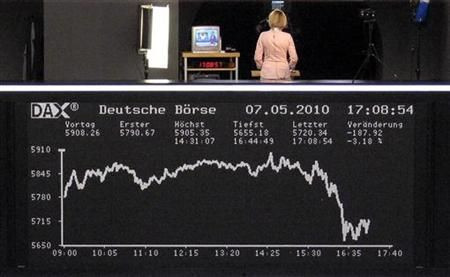European Stocks Jump On Covid-19 Vaccine Hopes Ahead Of ECB Meeting

KEY POINTS
- Britain’s FTSE-100 index gained 1.33%, while France’s CAC-40 climbed 1.73% and Germany’s DAX bourse rose 1.32%.
- Pfizer and BioNTech said they expect to commence the next phase of their vaccine trials in late July.
- ECB President Christine Lagarde will provide an update on its emergency asset purchase program
Stocks on European markets posted handsome gains on Monday as traders were buoyed by some strong earnings reports and hopes for a possible covid-19 vaccine.
Britain’s FTSE-100 index gained 1.33%, while France’s CAC-40 climbed 1.73% and Germany’s DAX bourse rose 1.32%.
Stocks in the European travel & leisure, banking, technology and oil & gas sectors showed particular strength on the day.
The U.S. Food and Drug Administration applied “fast track” designation to two experimental coronavirus vaccines being developed by U.S. pharmaceutical giant Pfizer (PFE) and German biotech company BioNTech (BNTX).
Pfizer and BioNTech said they expect to commence the next phase of their vaccine trials in late July with 30,000 subjects. The two companies also expect to have 100 million doses of a vaccine ready by the end of this year; and more than 1.2 billion doses prepared by the end of 2021.
BioNTech shares soared 14.31% on Nasdaq as of 12:50 p.m., while Pfizer shares were up 5.25% on the New York Stock Exchange as of 12:50 p.m.
Shares of BioNTech’s depository receipts surged 13.5% on the Frankfurt exchange.
“The sooner a vaccine comes out the more confident economies can get about opening up completely and start to get on the road to recovery,” said Michael Baker, analyst at ETX Capital in London.
Monday also kicked off quarterly earnings season in Europe.
Companies listed on the pan-European STOXX 600 Index are expected to post a 54% plunge in second quarter earnings, the biggest drop ever recorded in Europe, according to Refinitiv data.
“There appears to be some optimism that [earnings] forecasts have been lowered to such an extent that [companies] will be able to clear this low bar and surpass expectations,” said Russ Mould, investment research director at AJ Bell of Manchester, England.
Traders in Europe are looking forward later this week to a meeting of the European Central Bank where President Christine Lagarde will provide an update on its emergency asset purchase program.
In June, the central bank enlarged its emergency asset-purchase program by €600 billion ($682 billion) to €1.35 trillion ($1.53 trillion).
However, some ECB officials doubt the central bank will ever actually spend the total amount allotted under the program.
Dutch central bank governor Klaas Knot suggested that asset purchases may be scaled back if the euro economies recover from the pandemic faster than expected.
Since the ECB’s intervention, borrowing costs in Italy and other virus-hit southern European nations have eased to pre-crisis levels.
“The tightening of sovereign spreads that we have seen is conditional on the ECB following through and spending the whole amount,” said Antoine Bouvet, a strategist at ING. “If this idea of stopping [the asset purchase scheme] early becomes official ECB communication, I think you’ll see markets fall out of bed.”
© Copyright IBTimes 2025. All rights reserved.





















